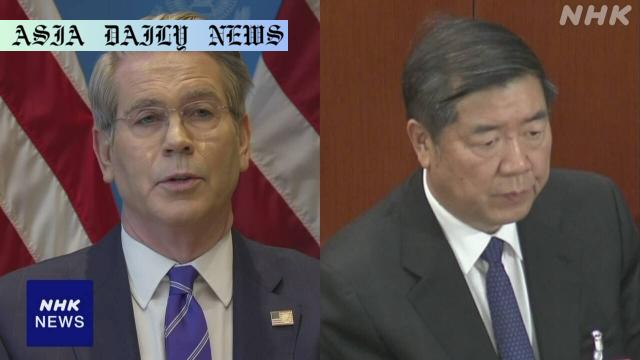Trade Talks: The US and China begin negotiations in Stockholm, addressing trade deficits, rare earths, and extended tariff deadlines.
- Key Point 1: US and China are resuming talks to resolve trade disputes in Stockholm.
- Key Point 2: Discussions will focus on tariffs, rare earth exports, and market accessibility.
- Key Point 3: The US aims to expand agricultural exports to China to address its trade deficit.
- Key Point 4: China demands the rollback of Trump-era tariff measures, seeking fairer trade terms.

Introduction to the US-China Trade Talks
The intricate relationship governing trade between the United States and China has once again come to the forefront as top officials from both nations prepare to engage in critical negotiations in Stockholm, Sweden. US Treasury Secretary Scott Bessent and Chinese Vice Premier He Lifeng will lead their respective delegations, aiming to address trade imbalances and foster cooperative solutions.
Focal Points of Negotiations
The focus of these talks will predominantly revolve around the contentious issue of tariffs introduced during the Trump administration. Both nations imposed heightened tariffs, which significantly disrupted global trade. During this meeting, the United States is expected to push for China to open its markets further, particularly in agriculture, to facilitate American exports. On the other hand, China aims to press for the abolishment of tariffs and ensure a fair trading ecosystem between the world’s two largest economies.
Another vital component of these talks relates to rare earth element exports. In prior agreements, restrictions were eased on these critical materials, which are indispensable for sectors ranging from tech manufacturing to energy production. Addressing this evolving trade dynamic will likely be another high-stakes aspect of discussions.
Potential Deadline Extension
A significant development anticipated in this meeting is the discussion on extending the August 12 deadline on a 24 percent tariff pause by an additional 90 days. Both sides view this extension as a necessary step toward crafting a more comprehensive agreement. However, such flexibility demands careful consideration of economic implications.
Outlook Ahead
The stakes are undeniably high for both nations, and these bilateral meetings may set the foundation for future agreements. While the US aims to curb its trade deficit by gaining improved market access, China remains steadfast in calling for equitable treatment and elimination of punitive trade measures.
Ultimately, the outcome of these negotiations could play a pivotal role in stabilizing not only the US-China economic rapport but also the global trade environment.



Commentary
The Importance of US-China Trade Negotiations
The upcoming round of trade talks between the United States and China is a reminder of the delicate balancing act required to manage the two largest global economies. These negotiations are not merely about resolving immediate issues such as tariffs or trade deficits; they also reflect the broader complexities of maintaining economic relationships amid shifting geopolitical dynamics.
The Need for Bilateral Cooperation
The decision to hold these talks in Stockholm signals a neutral venue, emphasizing the mutual desire to find common ground. For the United States, addressing the trade deficit and ensuring market access for agricultural products are critical. Meanwhile, China’s emphasis on removing tariffs imposed during the Trump administration highlights its commitment to re-establishing fairer trade practices.
Future Implications of These Talks
What transpires from these negotiations will not only determine the immediate trade relations between the US and China but will also ripple across the global economy. A positive outcome could lead to a more stabilized trade environment, while any unresolved issues or breakdowns could exacerbate economic uncertainties. Moreover, as both nations discuss sensitive topics such as rare earth exports, these talks carry strategic significance, impacting key industries worldwide.
Beyond the economic ramifications, these negotiations also highlight the need for sustained dialogue and compromise. Trade disputes, left unchecked, have the potential to escalate into broader conflicts, making these discussions a crucial measure in mitigating potential tensions.
Overall, the Stockholm meeting underscores the importance of proactive and cooperative diplomacy in tackling shared challenges. One can only hope that both nations prioritize long-term benefits over short-term victories, paving the way for a more equitable and sustainable trade relationship.